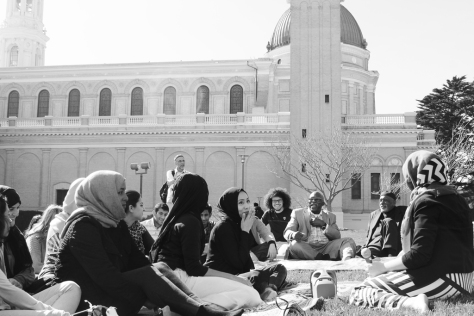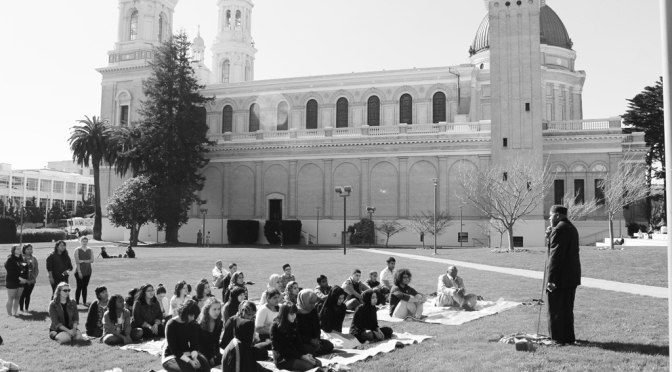Ben Gill
Staff Writer
The world was shocked, saddened, and outraged on Feb. 10 following the brutal murder of three Muslim college students at an apartment complex in Chapel Hill, NC by their white neighbor over what was initially described as a parking dispute, but is now widely believed to be a hate crime.
Two of the victims, Deah Shaddy Barakat, 23, and Yusor Mohammad Abu-Salha, 21, were recently married and attended the University of North Carolina and North Carolina State University, respectively. The third victim, Razan Mohammad Abu-Salha, 19, a sister of Yusor, also attended North Carolina State University. Following the tragedy, hundreds of thousands across the globe began tweeting and posting on Facebook using the hashtag #MuslimLivesMatter — a reference to the popular #BlackLivesMatter hashtag — to condemn the act and honor the slain students.
On Friday, Feb. 20, the USF community came together on Gleeson Plaza in a vigil organized by the Muslim Student Association to commemorate the dead and discuss the issue of Islamophobia in the United States. The attendees covered the cultural, religious, and ethnic spectrum in a diverse outpouring of support.
Local Imam, Abu Qadir Al-Amin, from the San Francisco Community Muslim Center, delivered a sermon reflecting on the crime. “The same kind of respect we’re told we should have for God (in the Qur’an)…we’re told that we’re to respect everything in creation,” said Al-Amin.

Al-Amin — who grew up in Illinois during the civil rights movement — evoked parallels between hate crimes committed by white supremacists during the struggle for racial equality and the one in Chapel Hill during the fight for fair treatment of American Muslims.
“In 1963, a church was bombed in Birmingham, Alabama and four little girls were burned to death as a result of the bomb that was placed at their school. So that became a part of the civil rights struggle, the struggle for the dignity and rights of all human beings. And many things changed in society as a result of that. We hope that some good will come out of this tragic situation.”
Al-Amin emphasized that Muslims should be “aware of the environment we’re in while at the same time being the best that we can be in representing ourselves to dispel the myths and stereotypes that prevail about us.” He called upon Muslims to be advocates for change by informing non-Muslims about the true, non-violent nature of the faith.
“I’m here to say that we [Muslims] are here to make a contribution to America, to improve upon the beauty of America because America is a pluralistic society,” said Al-Amin.
Following the sermon, as well as a prayer and reading from the Qu’ran, the event transformed into a public forum for everyone to share their thoughts, questions, and reflections.
Muslim Student Association Vice President, Sabrina Arsalene, said, “I feel like if a Muslim had done this, the reaction would have been different… How we’re treated [in the media and in public] isn’t fair.”
“I think that this tragedy really encompasses all of the tragedies that happen everyday to Muslims and to people who look like Muslims,” said Arsalane, “Sometimes as a Muslim in America you really do feel alone and it really touches my heart to see everyone come out who support and who care.”
Much of the discussion centered on the portrayal of Muslims in American media and culture. Students pointed to a right-wing movement that profits and benefits off of “fear-mongering” and spreading propaganda that paints Islam as inherently violent and suspicious.
Some other students criticized the killing’s perceived lack of coverage by mainstream news organizations, but many of those in attendance also highlighted the power of social media to inform and disseminate ideas, including addressing the killings in Chapel Hill with tools like #MuslimLivesMatter.
On this point, Al-Amin commented that, “The people have control over social media. A hashtag can help.”
Whether viewed as a silver lining to an otherwise dark moment or not, everyone interviewed echoed the same hopeful sentiment.
“Right here, right now with this event you had people coming out and supporting us who were just walking by,” said Arsalane, “Even if we can just educate one person, that really does make a difference. It’s more about quality than quantity when it comes to movements and bringing awareness.”
Photo Credit: Larue Burks/Foghorn

